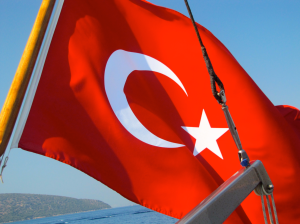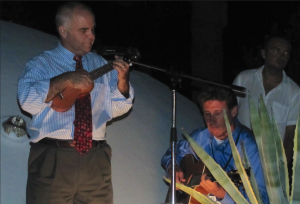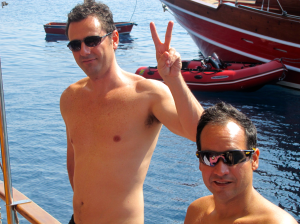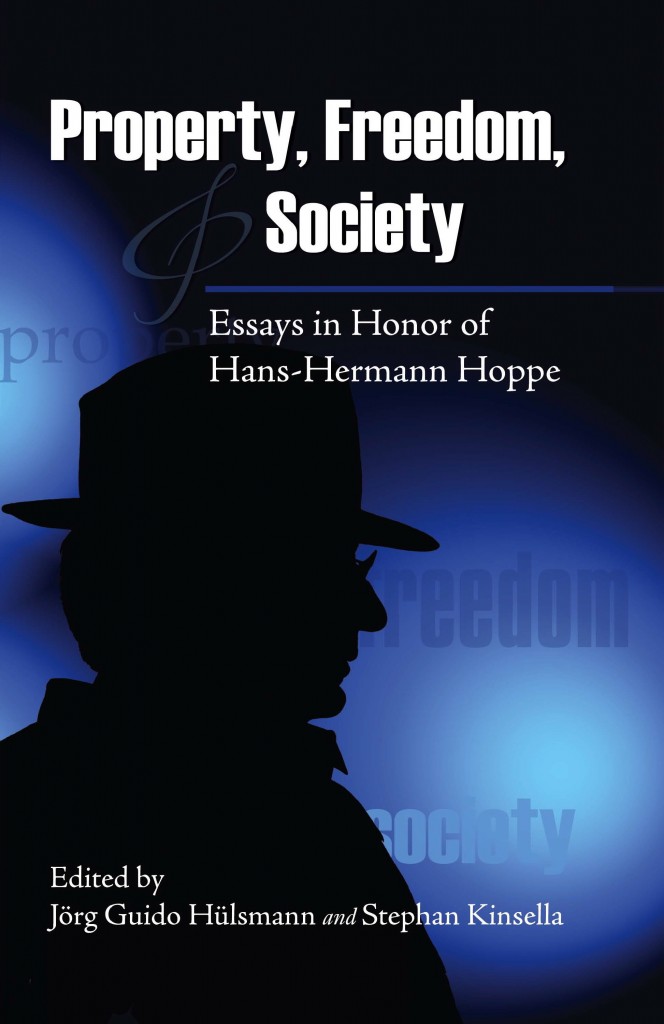The latest report on the recently-concluded 7th Annual Meeting of the PFS, by the Cobden Centre’s Andy Duncan, is appended below. Previous reports include Jeff Tucker on PFS 2012: The Center of the Conspiracy and Doug French on PFS 2012: The World’s Greatest Haircut; Duncan’s report from last year’s meeting is Outside the Asylum: Property and Freedom Society, Bodrum, Turkey, 2011. (For other accounts of previous Annual Meetings of the PFS, see our Press page.)
Inside the conspiracy: Property and Freedom Society, Bodrum, Turkey, 2012

In my article last year entitled Outside the Asylum, I described the joys of being alive at Professor Hans-Hermann Hoppe’s annual Property and Freedom Society conference, held in the beautiful Turkish harbour town of Bodrum. I compared and contrasted this to life everywhere else, inside the asylum of the organised criminal set of insidious tax farms known as the world’s nation states.
This year, I thought I would stay strictly inside the conspiracy of the professor’s bid to help the world become a place of eternal peace and prosperity for all.
It’s an outrageous aim, I know, but someone has to do it.
The particular beauty of the professor’s conference is that unlike a second coffee, which is always less good than the first creamy cup of the day, these conferences just keep getting better and better, as personal friendships develop and the Austrian movement becomes ever more vibrant and rich in its breadth and scope.
Getting a ticket to the event, via a private invitation from the professor, is for me the hottest global entry ticket to any event anywhere, far surpassing any special golden invite that a random Willy Wonka could dream up for any random chocolate factory, even one making really dark chocolate.
All of the following speeches were fully recorded by professional videographer, Michael Parley Griffith. As soon as those videos become available, I will make all of the links available here, except of course for my own lecture, as you will have to roast me in hell for five hundred years before I ever watch myself on video.

Remarkably, the conference did begin with yours truly delivering a short talk on Liberty through Literature. I contended that those of us who consume Austrian Economics, who will likely never produce a great non-fiction book such as Economics in One Lesson orBourbon for Breakfast, can best contribute to the cause of true freedom via the medium of fiction instead, whether via novels, short stories, graphic novels, movie scripts, or West End musicals. I believe that this cultural meme experiment is an interesting thing to do, both for the sake of individual creative ambition, but also a vital thing to do to help Austrianism penetrate beyond the tightly circumscribed realm of anti-intellectual intellectuals.
The Austrians, especially since the publication of Von Mises’s A Theory of Money and Credit in 1912, have had to aim at fighting the ideological war against the enemy class, these days best represented by the skin-creepingly appalling Paul Krugman.
However, I believe it is time for our one percent to stop devoting all of its energy tacklingtheir one percent. We have won the ideological argument. Yes, we need to maintain this victory, but we now need to try to capture the battleground of the ninety-eight percent in-between us. We can do this via every cultural media we can think of, but especially via the latest cultural dissemination devices we see all around us in planes, trains, and automobiles, as represented by the Amazon Kindle.
With an inner core of unconscious reality economics accessed via an outer core of conscious imaginary economics, most people are in a permanent state of cognitive dissonance. To relieve this aggravating dissonance, they engage in cultural escapism, for instance by reading passionate love stories on Kindle devices. It is only here, in a world of glorious fiction, that most people find temporary sanity in a world of state-induced madness fuelled via the specialised communism of democracy through which we all try to rob each other.
I believe the Kindle and its electronic friends are a fantastic second front for the Austrian movement. Those of us who can, must still keep up the pressure in the non-fiction ideological war. However, the rest of us can help too. We must open up the Rothbardian cultural battlefront. We need to capture the world one Kindle at a time and one creative achiement at a time. This is why my very good friend, Jack England, has written his Rothbardian novel, Sword of Marathon, to try to explicitly begin this experiment, using all the latest publish-on-demand techniques to extend and develop his personal message of freedom.

It’s time for us to put down our Heinlein books and our Rand books, and to start creating something new. That’s to say, a literature filled explicitly with the spirit of Murray Rothbard to help people shake off their Stockholm-syndromes of statist beliefs and to funnel them instead towards our greats, such as Hazlitt, Mises, Rothbard, and Hoppe.
We must avoid polemics, such as Atlas Shrugged, and avoid dystopias, such as Nineteen Eighty-Four. Instead, we need to create real stories full of hope and passion, that will capture people emotionally and leave them feeling positive and hopeful.
Anyhow, I think I said something like that.
It was all such a blur, being introduced by Hoppe himself, that I actually delivered the lecture from a disembodied point five feet above my own head. However, people seemed to like what I had to say, even if they didn’t necessarily agree with it. And I could have said much more, but felt overwhelmed by the occasion.
Indeed, this entire conference seemed much more combative than earlier ones, with many speakers and attendees prepared to open up different fronts in different cultural wars to help the ninety-eight percent escape their thralldom from the state, rather than just wanting to write another Introduction to Austrian Economics to preach an appeal to the already converted or to the small number of people capable of reading and understanding Human Action or the slightly more accessible Man, Economy, and State.
The rest of the day was quite heavily political in feel.
First we had the Scottish intellectual Norman Stone on the comparative history between Turkey and Spain, which do appear quite similar when you examine the cultural clashes necessary for a state to hold together a widely-differing set on internal peoples. And although General Franco has generally been given a much easier ride than either Hitler or Mussolini, over time, Franco’s great evil was fully exposed in this talk, memorable for Professor Stone’s insistence that if Scotland were ever to become independent from England, then he would give up his British passport for a Turkish one. This was an interesting observation in a room full of secessionists, though it still drew a good response from the more-than tolerant crowd.

Professor Hunt Tooley, with his splendid Texan accent, then explained the full meaning of the CIA’s engineered coup in Iran, in 1953.
The ramifications of this gross unwanted interference are still ringing in our ears to this day, much as the probable microwave background radiation of the universe’s Big Bangstill resonates in our skies, to this day, twenty billion years after the event.
We can hear the noise of the Big Bang every time we hear static on a radio. And we can hear the war drums of the neocon-desired conflict beat around the ancient Persian empire. Professor Tooley explained who is beating these drums and why.

After a break, to complement Professor Tooley the splendidly named Rahim Taghizadegan filled us in on the culture of Iran, a country named in its own language as the home of the Aryans, which just in itself probably informs you that there’s much more to the Iranian peoples than meets the eye.
As someone with a deep interest in ancient Indo-European mythologies myself, I was also fascinated by his descriptions of Ahura Mazda, Angra Mainyu, and the other ancient Persian gods, and their similarities to modern mono-theistic religious elements.
To finish off this first day, Karl-Peter Schwarz gave us a detailed and comprehensive account of the complex problems suffered in eastern Europe due to the growth and then collapse of communism.
And so to a relatively quiet civilised evening by the pool, to discuss the day’s events. And drink a lot of wine.

The hardcore second day centred around that favourite Austrian topic, money.
We began with Professor Joseph Salerno discussing the soundness or unsoundness of money. Perhaps the pre-eminent Austrian money economist alive today, Professor Salerno described the peculiar and absurd institution of fractional reserve banking, the imperial money monster which has so enslaved the world.
This speech dovetailed neatly with the following warm and humourous speech of Professor Guido Huelsmann, on the state’s interactions with the gold market, with Huelsmann describing gold as one of the best preservers of liberty, which is why the state hates it so much and why it is so obsessed with its relative price against its rotten inter-linked fiat currencies.
In describing how the state has tried to rip gold out of its pre-eminent position as a freely-chosen ethical money, I was struck by Professor Huelsmann’s description of government, to wit, that it is simply an immoral business involved in the acquisition of excessive wealth from everyone else in society.

Next followed a blistering speech by Professor Thorsten Polleit on the inevitability of hyperinflation, once a pure fiat monetary system is finally developed by Professor Huelsmann’s acquisitive state.
First, the state insists on a monopoly of precious metal money production. Then, step by step, it works its way, even over centuries, towards a pure fiat system. Once this is fully instituted – as has been the case in the global economy since 1971 – a process of ethical rot sets in which Professor Polleit labelled Collective Corruption. This insidious process leads to everyone running faster and faster on a monetary treadmill, to try to exploit everyone else. Eventually, the ball-bearings of the hamster treadmill break and the treadmill spins off into chaotic hyperinflation.
After lunch, Doug French of Laissez Faire Books, explained one such example of the fiat currency hamster wheels coming off due to the absurdity of a monetary system based upon fractional banking and its constantly-expanding digital reserves. He based his talk around the implosion of Washington Mutual. His talk was memorable for his answer of “Not Much”, to the rhetorical question of how much do bankers know.
And then followed an amazing trip to a local Turkish fishing village, a different venue from previous years, which was fairly classy and upmarket, and therefore admirably suited to the task of refreshing the Property and Freedom Society.
Lanterns were lit, conversations were enjoyed, fine wines were imbibed, and very large cigars were smoked. All in all, another splendid evening.

The third day, however, was for me the best, especially the conference’s most entertaining speech, that of Antony Daniels, known better, perhaps, as his irascible alter-ego, Theodore Dalrymple.
In a smorgasbord of lugubrious delight, the rhetorical highlight was his fruity description of the charming English locale of Middlesborough. This is a grim north-eastern steel town without a steel mill, along with Soviet levels of government intervention in the local economy. Most in the town either live on direct welfare or the indirect welfare of mundane government jobs in tax helpline centres and the like, monoliths which are incapable of helping anyone including the poor benighted souls who inhabit their grey useless cores.
Daniels described the charming sight that greeted his awakening at his Middlesborough hotel one fine sunny morning. Six pizza shops lined a street over two hundred yards. A seventh pizza shop had closed down to indicate the global economic crisis that will strangle us all until we can prise the Keynesians away from their Wizard-of-Oz printing-press levers.
With nothing in their lives to choose except today’s flavour of pizza, Daniels observed that many of Middlesborough’s native inhabitants were so grossly fat that they needed state-provided electric wheelchairs to perambulate their vast metabolic-syndrome bodies between the various different pizza houses.
Such does the engine of state seek to enslave us all, as its inbuilt totalitarian impulses constantly try to remove the adverse consequences of failed choices, thus destroying responsibility and thus destroying lives.

The day had begun with a phorensic speech by Stephan Kinsella, an anti-patent patent lawyer, on the corruption of law and its monopoly takeover by the state. In a ruthless manner, he laid out the creations of the various private law systems of the early lawfinders, and then described how private law has descended into the chaos of law making, in which an endless stream of corruptive legislation has replaced principle and common sense.
Following Mr Daniels, Jeff Tucker charted how the modern state is now trying to drag us all back to the nineteenth century, for instance by making dishwashers too inefficient to actually use. They do this via the bannings of drain lyes and detergent phosphates, along with compulsory restrictions on heat and water usage. Eventually, the state hopes everyone will return to the drudgery of hand-washing if they want to eat off clean plates. Why does Leviathan want this? To satisfy the latest ecomentalist bleatings of its rent-seeking intellectuals necessary to prop up the state.

Mr Tucker’s description of the bed bug epidemic was so squeamishly unpleasant that I hardly dare relate it here. All I will say is that I am unsure which is the worst thought about visiting the United States; the horrors of the TSA or the chance of being eaten alive by blood-filled bed bugs caused by the government banning anything which can eradicate them.
What was surprising was the extent of the United States government’s obsession with making life worse for its citizens, to the point of breaking gasoline dispensers with air filter regulations and breaking toilets to make them deliberately unhygeinic. No doubt all the state’s bureaucrat palaces will still have fully-functioning indoor plumbing, the mark of civilisation, while imposing water and energy restrictions on everyone else.
What is remarkable to me is how this is being done in a land founded by revolutionary smugglers. How did it get to be so bad in America, worse perhaps than anywhere else in the western world?

Mr Tucker was also keen to request that in the non-fiction onslaught against the enemy, we already have enough straight non-fiction books about basic economic principles. As the principal of Laissez Faire Books, what he would like to see are books on current events and real lives, and how they are affected by the one percent of our evil, stupid, and greedy rulers.
So if you feel a novel is wrong for you, then write something current instead, and you may see your name in lights via that particular route.

Professor Hoppe delivered the keynote speech, an evisceration of Friedrich von Hayek’s views on freedom and coercion. As well as providing socialists with a means of saying “even Hayek agrees with us” on various matters, such as welfare and taxation, Hayek’s woolly views on coercion allow the left to use him as a straw man.
We saw this recently on the BBC, with an hour-long documentary on Hayek, portraying him as our most radical and hardcore thinker, without once mentioning Mises, Rothbard, or Hoppe. Having established Hayek as the Dean of the Austrian School, when he is merely one of its lecturers, this makes it easy for the left to attack us via Hayek’s weaknesses and wide-open intellectual chinks.
Hence this attempt by the professor to put Hayek to bed.
Finally, Ben Marks gave a remarkable speech in which he detailed the thoughts of H.L.Mencken, one of the literary inspirations behind Murray Rothbard. As I was a little the worse for lack of sleep and too much wine, over the preceding few days, I was getting a little hazy at this point. Mr Marks seemed to say that we were all wasting our time trying to stop the rolling process of the state, but that we should all attempt to enjoy the process of ridiculing the absurdity of government.

And as Mr Marks wore such a splendid smoking jacket a few hours later at the gala evening, this made up for any confusion. May he forgive me if I failed to understand him. For I was, at this point, in possession of the attention span of a small field of daffodils without a single tulip.
Fortunately, I was revived at the gala evening dinner by some splendid lady violin players and my own determination to dance with as many of the ladies present who would dare take me on as a partner.
I really must take dancing classes again, but it was a lot of fun.

And so to the best part of all, the annual boat trip out into the Mediterranean to a remote cove, Hoppe’s Gulch, where a hundred Hoppeians frolicked in the cool clear waters and where indescribably beautiful women – upon nearby boats in our flotilla – wore the slinkiest of skimpy bikinis.
Fortunately for me, I had been selected for Bad Boyz Boat II, along with lashings of extra beers, wines, and light Bombay Sapphire refreshments donated by one or two of our generous Bad Boyz club members. I can only hope that I make it upon Bad Boyz Boat III, next year, such is the ebullient wonder of this glorious floating liquor palace.

It really doesn’t get any better than this, if you’re one of these faithful hundred. Indeed, as I was staring at the blueness of the rippling waters alongside my great friend, Michael McKay, we somehow both entered a transcendental moment where we had never been anywhere else in our lives except this remote cove.
And although only a lucky fifteen had been selected for our boat, many more swam over to fill our gunnels and drink our beer, with many other boats depopulating to attend our private party.
Alas, our day had to end. When Paul Vahur – the Property and Freedom Societyphotographer – called out to me that our boat was leaving. I had been invited to another of the fleet to share a wonderful gin and tonic, so I had to quickly return to the mothership via motorboat, otherwise I would have been stranded in a remote corner of Bodrum wearing nothing but a rather small pair of indiscrete swimming trunks.
I was prepared to take that risk, but the boat transfer had been arranged.
That distraught moment as I clambered the watery steps of my own moving boat shall continue to live in my mind forever as the cessation of Hoppeian bliss and the annual re-beginning of life inside the asylum.

And so the sadness of departure overwhelmed us all – as people slowly disapparated into airport taxis – and the long march to next year’s event began. Another year of living inside the asylum and then we can return, assuming we can secure the necessary magic ticket. In that year, I have to persuade my friend Jack England to finish his second novel on Sparta, Thermopylae, and Salamis, so I can find out what happens to the extremely rude love lives of his heroic fighting-action characters.
He’s told me that his two main characters have just joined the Spartan army in the first draft and that they’re collecting Delphic oracles for King Leonidas, from the extremely desirous Pythoness of Delphi. However, he will reveal no more for the moment.
It would be great if I could take along Mr England’s completed and printed novel to the next Bodrum event. But whether he succeeds in that mission or fails, I’ll be desperately hoping for another invite to rejoin the Hoppeian conspiracy, outside the asylum.




You must log in to post a comment. Log in now.